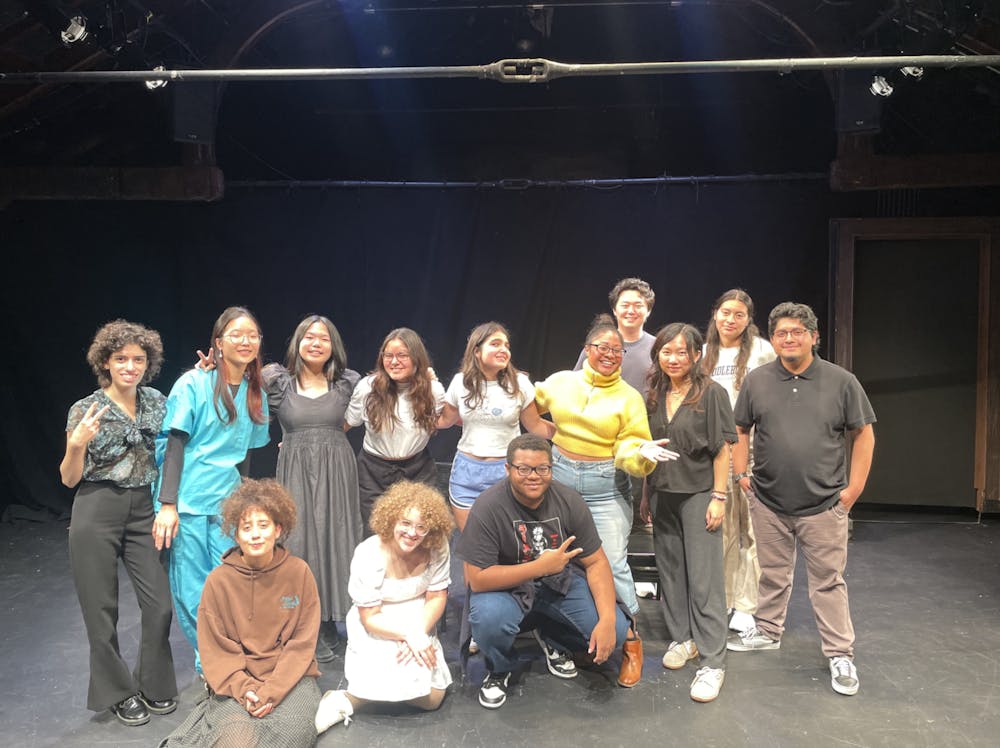There is nothing quite like the feeling of sitting in a theater waiting for the curtain to rise, for the actors to emerge on stage and transport the audience to another world. That anticipation, the rustling of programs and the low chatter of friends and family eagerly awaiting the start of the show filled the Hepburn Zoo this past weekend as audiences came in to see the 29th annual First Year Show.
Directed by Visiting Professor of Acting Ashley Baptiste, “Echoes of Truth” opened on Oct. 3 and finished its run on Oct. 5. The production saw nine first year students make their stage debut at Middlebury — some of whom had participated in their high school theater program, and others who were acting for the first time. No matter their backgrounds, the company of “Echoes of Truth” put their hearts and souls into the production. Their performances embodied the core question of the show: “Who are you?”
At the beginning of the semester, the cast embarked on a three-week process led by Baptiste to devise the show. This existential theme of “Echoes of Truth” was inspired by Baptiste’s performance workshop series titled “I Am” which has been in development for a few years. With the main scenes having been carefully selected by Baptiste to highlight the performers’ strengths, the cast was then left to create their own scene transitions. They wrote poems and monologues and chose what song(s) they wanted to underscore those moments. Each scene and transition had something to contribute to the show’s themes of family, friends, self-expression and revelations of truth.
On Saturday afternoon, my curiosity was piqued by a minimal stage design. There were three white blocks in the center of the floor, a doorway and chairs lined up against both the left and right sides of the stage, which would later be used by the actors to watch their fellow castmates as both spectators and members of the company. Considering the Hepburn Zoo’s close quarters and dimly lit ambiance, I knew I was in for a night of intimate and immersive theater.
The show began unexpectedly with no director’s address to signify the transition into the world of the piece. Instead, the audience's attention was suddenly diverted from their pre-show conversions and phone scrolling by the sudden entrance of an actor from behind the black curtain backdrop. Moving slowly, she was soon followed by the rest of the cast, all of whom found an open space on stage, quickly filling out the small room. The lights shifted and a hum of music began to play — we had finally been transported into “Echoes of Truth.”
The opening segment of the piece consisted of all nine actors swaying along to the music, performing a distinct action through flowing movement; making and throwing a snowball, fixing hair and clothes in a mirror and various karate positions, to name a few. The silence was broken when the actors, in roaring unison, spoke the words “I am.” What followed was a ripple effect of each actor giving their own personal “I am” statements. This opening scene invited the audience to think about what their own statements might be.
The main scenes were a selection from “Almost Maine” by John Cariani, “Death Tax” by Lucas Hnath, “Be Aggressive” by Annie Weisman, “52nd to Bowery to Cobble Hill in Brooklyn” by Chiara Atik and “The Dream of the Burning Boy” by David West Read. These scenes varied greatly in terms of characters, storylines and context. Audience members were transported from the blossoming of young love to the grief of a mother trying to save her son to an awkward taxi ride between two new acquaintances and beyond. But whether comedy or drama, each scene had one clear element that tied them all together and justified their place in “Echoes of Truth”: a revelation of someone or something. A truth uncovered.
The final moments of the show repeated the opening’s music, movements and “I am” statements. However, after having seen the show in its entirety, this exercise carried a new weight. The audience was able to see how all these different elements were interwoven and, in the end, returned to the core question of who we are. This question of identity was the driving force of “Echoes of Truth” and was what stayed with me even hours after having left the theater.




